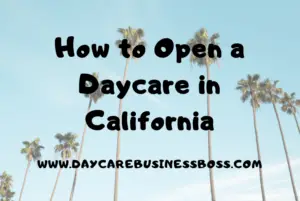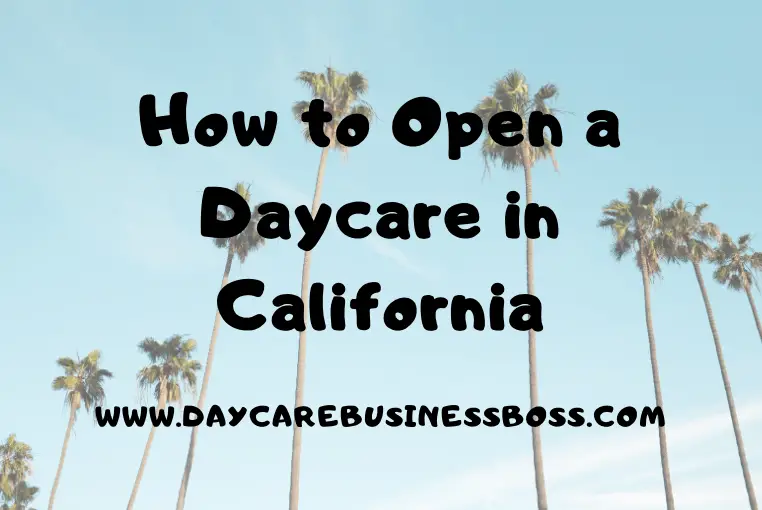Daycares and child care centers can be highly lucrative endeavors. Even more so in states with highly populated areas and high median household incomes like California.
According to Bloomberg, the Golden State is home to some of the United States’ wealthiest cities. Plus, based on recent statistics published by the HRSA MCHB, more than 49% of children between the ages of 0-5 y/o in California attend a daycare or childcare center for more than ten hours a day.
As a result, opening a daycare in California is, without a doubt, a good business opportunity. Nonetheless, you must know that starting a child care business in California involves a particular set of legal considerations — specific to the type of business and the State.
If you wish to open a daycare in California, you must consider the following steps:
-
- Determining your business’ structure
- Obtaining all legal permits and licenses
- Complying with all health and safety regulations
- Requesting tax deductions (if it applies)
- Hiring the right employees
Below we will go over each of the steps mentioned above to help you in the process of opening and successfully running a daycare center in California.
1. Determining your business’ structure
The first step is to determine your daycare’s structure. In California, childcare centers are usually categorized into two groups:
• Child Care Centers
A child care center or daycare center generally operates in a commercial building. Here, non-medical care and supervision are provided for children from 0-6 years old in a group setting for a specific time.
• Family Child Care Homes
A family child care home is located in an approved or licensed home where non-medical care and supervision are provided for children for a specific time. There are small family child care homes (care for up to 8 children) and large family child care homes (care of 8- 14 children.)
Once you have decided what type of business you want to run, you can move on to the legalities.
Learn how to write a business plan HERE!
2. Obtaining all legal permits and licenses
 In California, the Child Care Licensing Division (CCLD) of the Department of Social Services (DSS) is responsible for approving and licensing all child care businesses.
In California, the Child Care Licensing Division (CCLD) of the Department of Social Services (DSS) is responsible for approving and licensing all child care businesses.
Hence, if you plan to run a daycare that looks after more than two children (who are no related to you), you will need to obtain a license — even if you are running a family child care home. Operating without a license can have severe legal repercussions.
Keep in mind that license and renewal fees are higher for Child Care Centers. And that regulations are more stringent when you are operating from a commercial building as generally more children are under your care.
Steps to obtain a Child Care license
To obtain a child care license and be able to operate your business legally, you will need to follow these simple steps:
1. Attend an orientation session dictated by the State
Here, you will familiarize yourself with all childcare licensing laws, regulations, and requirements.
2. Complete a license application
Here, you will be required to provide relevant information such as the ages of the children under your care (e.g., infants, toddlers, preschoolers, school-age), the number of children that will attend your center, location and description of the property where the services are going to be provided, whether your daycare is a for-profit or non-profit organization, and key personal information (e.g., owner’s name, contact information, criminal record)
3. Pay the license fee
Depending on your business structure, the annual licensing fee can range between $73-$200. Plus, you will need to renew your license annually (as long as you remain in business.)
The State will usually send you a bill with the amount you need to pay at least 60 days before it is due.
License-Exempt Child Care Centers
Know that there are four types of child care providers that are exempt by the State from obtaining a child care license:
– Group 1:
The first group includes care providers who care for children who are directly related to them. For example, the children of a relative or their children.
– Group 2:
The second group includes public and private non-profit programs that offer recreational services.
– Group 3:
The third group includes businesses that provide short-time child care to their customers or employees. These programs generally demand that the parent or guardian remain on the premises.
– Group 4:
The fourth group includes programs that are overseen by other State agencies, such as organized camps and heritage schools.
3. Complying with all health and safety regulations
The Golden State is very serious about the safety of infants and small children. Thus, California’s child care safety regulations are pervasive. Below we will name some of the critical areas of State regulation:
-
- Criminal record clearances
- Fire safety clearances
- Training requirements for caregivers and staff
- Staff-to-children rations
- Disaster evacuation planning
- Foodservice handling permits
- Minimum required outdoor space
- Building fixtures and equipment clearances
- And more
Additionally, periodical inspections will be conducted by pertinent authorities such as social workers and fire marshals to ensure all children’s welfare and safety who attend the center.
Lastly, you will need various insurance policies, including General Liability coverage, Property Insurance, Worker’s Compensation Insurance, and Abuse and Molestation Coverage.
If you are unsure as to what type of policy best covers your business, we recommend you seek a professional’s help to avoid future legal repercussions or misunderstandings.
4. Requesting tax deductions
Most Family Child Care Homes are eligible for tax deductions. Thus, if you are running a daycare center from your home and are licensed by the State, you can apply.
For more details and information, you can visit the IRS’s official site.
5. Hiring the right employees
From a strictly professional standpoint, childcare givers need to be 18 years of age (or older) and have a high school diploma or GED. However, in California, caregivers who work with children two years old or younger must also:
-
- Have completed 12 units of early childhood education.
- Have at least six months of experience in a licensed care center.
- A criminal record clearance (including fingerprinting.)
- Be in good physical health and submit tuberculosis test results to the employer or licensing agency.
- Be certified in First Aid, CPR, and AED.
Furthermore, although not required by law, most child caregivers should also have a set of traits or “soft skills,” including:
– Great interpersonal skills
– Excellent communicational abilities
– A mature and positive personality
– Good problem-solving strategies
– Professional presence and appearance
– Be sensitive and accepting of different cultures, races, and religions.
 Keep in mind that there is a specific ratio of children: staff that you must comply with depending on the ages and number of children you plan to care for in the State of California. Below a list to help you understand it better:
Keep in mind that there is a specific ratio of children: staff that you must comply with depending on the ages and number of children you plan to care for in the State of California. Below a list to help you understand it better:
-
- 6 weeks (4:1)
- 9 months (4:1)
- 18 months (6:1)
- 27 months (6:1)
- 3-4 years (12:1)
- 5-7 years (14:1)
- 8-9 years (14:1)
- 10+ years (14:1)
Lastly, remember to conduct a thorough hiring process, including background checks, before offering any aspiring candidate the position. As we mentioned before, the laws for childcare centers in the State are stringent and very unforgiving. And as a daycare owner, you are legally responsible for everything that happens at your center.
Related Questions
1. What salary can I expect as a caregiver working at a daycare in California?
Wages for childcare workers in California vary broadly depending on your duties, work experience, and location. Generally, caregivers working in large cities like Los Angeles, San Diego, and San Francisco earn higher wages than those working in smaller towns and rural areas.
Nonetheless, according to a recent census, the median salary in 2020 for Childcare Workers in California was $28,780 per year ($13.83 per hour.) The highest percentile earned roughly $35,063 per year, while the lowest percentile earned approximately $25,556 per year. Keep in mind that most childcare workers usually receive health insurance, vacation, sick leave, and holidays.
2. What are the legal implications of dangerous childcare centers in California?
Owning and operating a childcare center is a big responsibility, no matter where your business is located. Therefore, if a child is injured, gets food poisoning (or in extreme case scenarios is abducted, sexually, or physically abused), the daycare’s owner and staff would be held accountable.
In the State of California, legal implications heavily depend on the circumstances. As a result, legal implications can range from a standard penalty, sanction, or admonition to severe lawsuits or even incarceration.
3. How much money is needed to start a daycare?
Depending on the scope, a daycare’s initial investment ranges between $10,000 to $50,000. This figure includes legalities, insurance policies, certifications, supplies, and marketing.
However, you will most likely have other expenses, such as payroll and additional administrative fees. Thus, make sure your business plan outlines all your costs and expenses and defines strategies that will allow you to effectively manage and secure the necessary funds to open your daycare center.

Please note: This blog post is for educational purposes only and does not constitute legal advice. Please consult a legal expert to address your specific needs.
To learn more on how to start your own daycare checkout my startup course and documents here.

Meet Shawn Chun: Entrepreneur and Childcare Business Fan.
I’m a happy individual who happens to be an entrepreneur. I have owned several types of businesses in my life from a coffee shop to an import and export business to an online review business plus a few more and now I create online daycare business resources for those interested in starting new ventures. It’s demanding work but I love it. I do it for those passionate about their business and their goals. That’s why when I meet a childcare business owner, I see myself. I know how hard the struggle is to retain clients, find good employees and keep the business growing all while trying to stay competitive.
That’s why I created Daycare Business Boss: I want to help childcare business owners like you build a thriving business that brings you endless joy and supports your ideal lifestyle.


